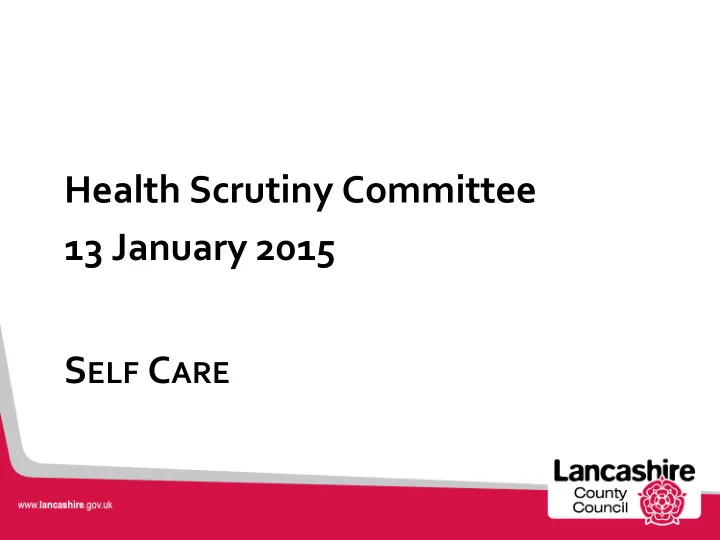

Health Scrutiny Committee 13 January 2015 S ELF C ARE
Looking at … • Self care • Asset based approaches • Health literacy • What’s happening
Self Care • Looking after yourself in a healthy way e.g. – brushing your teeth – taking medicine when necessary – keeping active – seeing friends and family • It involves looking at what you can do and want to do, rather than what you can’t do
Self Care
Self Care
Why Abandon Early? • Lack of confidence • Perceived severity & duration of symptoms • Reassurance that nothing more serious is wrong • A prescription to ‘cure’ illness is available
What is an Asset? • “ A health asset is any factor or resource which enhances the ability of individuals, communities and populations to maintain and sustain health and well-being. These assets can operate at the level of the individual, family or community as protective and promoting factors to buffer against life’s stresses. ” Antony Morgan, associate director, National Institute for Health and Clinical Excellence (NICE), 2009
Assets include … • the practical skills, capacity and knowledge of local residents • the passions and interests of local residents • the networks and connections (social capital) in a community, including friendships, neighbourliness, local community and voluntary associations • the physical and economic resources of public, private and third sector organisations that are available to support a community
A Set of Values and Principles • Which – sees citizens and communities as the co-producers of health and well-being, rather than the recipients of services – promotes community networks, relationships and friendships that can provide caring, mutual help and empowerment – supports individuals’ health and well -being through self- esteem, coping strategies, resilience skills, relationships, friendships, knowledge and personal resources – empowers communities to control their futures and create tangible resources such as services, funds and buildings.
What’s Happening • Community Asset Network • Health & Wellbeing Board • Working Together with Families • Connect 4 Life
Health Literacy in Lancashire Gulab Singh Specialist in Public Health
Health Literacy Health literacy is a social determinant of health and equally, it is socially determined. Higher levels of health literacy enable individuals to participate more fully in society. • 'the degree to which individuals have the capacity to obtain, process, and understand basic health information needed to make appropriate health decisions‘ Institute of Medicine, USA • 'The cognitive and social skills which determine the motivation and ability of individuals to gain access to, understand and use information in ways which promote and maintain good health ' World Health Organisation (WHO)
Health Literacy Health literacy can be looked at in terms of three issues: • Functional literacy: ability to read, write, count (in health contexts) • Communicative/interactive literacy: ability to discuss and participate (in health decisions) and gather and apply new (health) knowledge to changing circumstances and behaviour change • Critical literacy: ability to look at health information, decide whether it applies to you and is best for you, and to take greater control over life events and situations that influence health; especially for people with long term conditions.
Literacy is Context and Content Specific • More accurate to talk about literacies for example: – financial literacy, – Media literacy, – IT literacy and, – health literacy Slide courtesy of Dr Gill Rowlands, Kings College
Example: Bowel Cancer Screening Kit
Why is it Important? • Has been shown to have an effect on: – Health knowledge – Self-care skills – Health attitudes and beliefs – Health behaviours – Global health outcomes
Why might health literacy affect health outcomes? • Most patient instructions are written. • Verbal instructions: – complex – delivered rapidly – easy to forget in a stressful situation • Increasingly complex health system: – more medications, tests, and procedures – greater self-care requirements
European Health Literacy Survey 2012 Video • Health Literacy Survey Info-graphic
What’s Happening • To embed health literacy within policy, service re-design and public health programmes targeted at improving population health and increasing access to services. • Develop a health literacy awareness resource to be shared within LCC and service providers • Incorporate health literacy: – as part of service improvements in Clinical Commissioning Group (CCG) work programmes – within health champion provision – within basic skills courses (numeracy and English) delivered by further education providers across Lancashire
Next Steps • A two year commitment for implementing a public health campaigns led by the Communications Team , in alignment with Public Health England programme of social marketing • A collaboration with Liverpool CC & Belfast CC to produce two briefings for local politicians, policy makers commissioners for health & wellbeing based on the WHO Solid Facts document • In collaboration organise a regional workshop to mobilise action across sectors and settings.
Discussion Thank-you
Recommend
More recommend